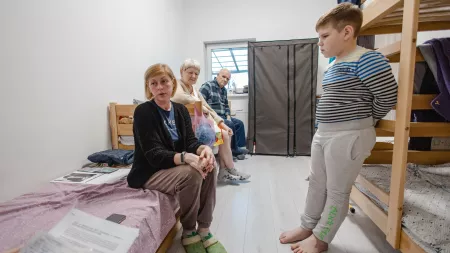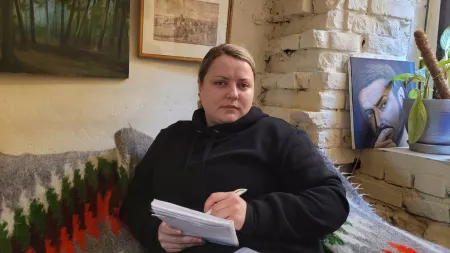Geneva/Lviv/Warsaw, 20 February 2023 - As the escalation of the conflict in Ukraine enters its second year, the global community must renew its support to the most vulnerable groups that have been affected, including women and girls, CARE said today.
There is a strong gender dynamic to this crisis; while women make up the majority of those displaced inside Ukraine and in neighboring countries, they are also rising up to support each other as part of the response.Sofia Sprechmann Sineiro, CARE International Secretary General
Women make up 59% of the 5.4 million people displaced within Ukraine. A staggering 86% of the 8 million who have sought refuge in Poland, Romania, Hungary, Slovakia, Germany, and beyond are women and children. Over the past year, sexual and gender-based violence has increased among Ukrainian women and girls.
"I didn’t know how to put my whole life in one suitcase,” says Natalia, who had just one hour to organize the evacuation of her eight-year-old son, Tymofiy, and parents-in-law. Now Natalia takes care of her son and her husband's sick parents, who all share a small room in a shelter in Lviv, organized by Women’s Perspectives, a CARE partner NGO. Tymofiy attends lessons online, but his biggest dream is "just to go to school with my friends."

In Ukraine and neighboring countries, women’s rights and women-led organizations immediately sprang into action one year ago, delivering lifesaving services to Ukrainian women and girls who are disproportionately impacted by the conflict and especially vulnerable to gender-based violence. Many organizations are held together by the work of volunteers from the displaced community themselves, who are supporting as translators, teachers, psychologists, and more.
One year ago, we knew we had to act fast. We had to find Ukrainian speakers to respond to the needs for sexual and reproductive health services for refugee women and girls.Krystyna Kacpura, President of FEDERA Federation for Women and Family Planning, a partner of CARE in Poland
Kacpura says that today, every third phone call to the Federa Helpline is from a refugee from Ukraine in need of a gynecologist.
Indeed, many displaced Ukrainian women are working as volunteers in such organizations. Lyudmyla, 38 and herself displaced by the conflict, does home visits for 200 sick people, often elderly and alone. "Many are also hungry. I visited a 90-year-old woman who hadn't eaten in a week," she says.

But despite this outpouring of solidarity within local civil society organizations and within the refugee community themselves, immense pressures persist. A CARE-funded safe space in Cherkasy, Ukraine, for example, has faced such a surge in demands for psycho-social support that women must wait almost a month for an appointment. Inna Kanivets, a psychologist who works at the safe space, says: “Lack of space to retreat, the constant tension, worries about oneself, family, fathers, brothers or relatives at the front cause great anxiety.”
“One year on, it is more crucial than ever to maintain our support to these brave women and the organizations working with them both in Ukraine and the surrounding countries,” says Sofia Sprechmann-Sinero. “We are in a marathon. And in a marathon, it is not the first minutes that are the hardest, nor the last. It’s the ones in the middle.”
Ukrainians are not the only ones facing human suffering. This year’s Global Humanitarian Overview aims to target an unprecedented 230 million people, requiring $51,5 billion to do so. And this was before the tragic earthquakes in Türkiye and northwest Syria. However daunting the challenge may look, the international community must put humanity first and support humanitarian relief everywhere, without distinction. In so doing, the centrality of gender equality, empowerment, and protection of women and girls and funding to the organizations that support them is paramount.
Notes to the editor:
From February 2022 to January 2023, CARE and partners have reached over 989,700 people affected by the crisis across Ukraine, Poland, Romania, Georgia, and Germany with protection and psychosocial support, cash assistance, food, water, sanitation & hygiene assistance, health services, support for accommodation, protection against gender-based violence and education. CARE is working with 56 implementing partners.
CARE and partners have reached:
-
650,000 people with food and nutrition support
-
254,900 people with water, sanitation, and hygiene assistance
-
161,500 people with health services
-
66,200 people with cash assistance
-
49,800 people with support for accommodation
-
51,400 people with protection services (other than gender-based violence prevention)
-
7,800 people reached with gender-based violence prevention
-
16,700 people with education services
For media inquiries, please contact, Senior Humanitarian Communications Coordinator – CARE International, Iolanda Jaquemet, via: [email protected]/ Skype: iolanda.jaquemet
